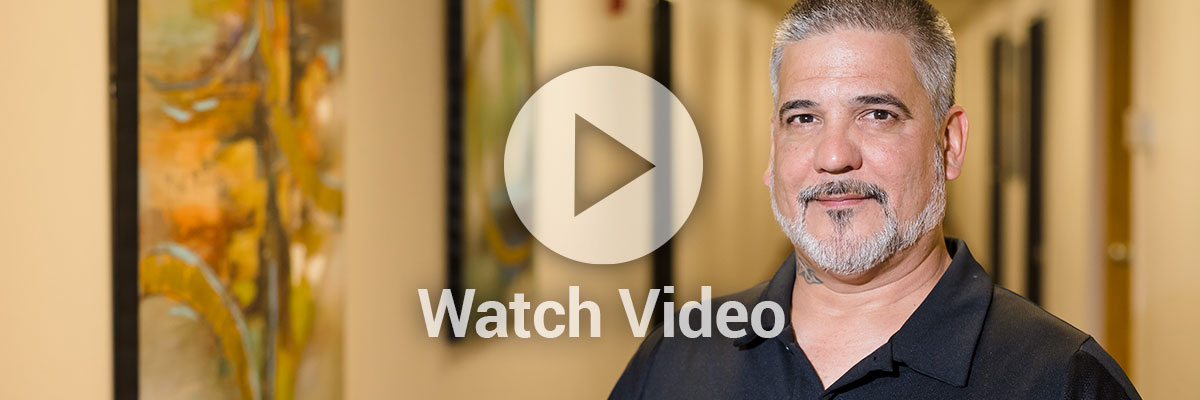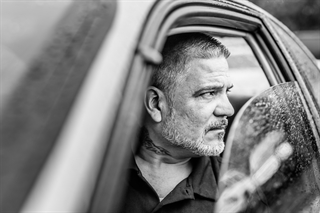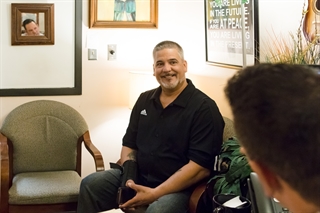
In August of 2017, the heating and a/c system in Ever’s Milwaukee apartment broke down. Ever tried everything to encourage management to fix it, including an offer to do the work himself. When his heating was still broken in December, Ever moved out of his freezing cold apartment and into his car.
“I was still paying rent because they told me I could get a new apartment when one opened up,” says Ever. “I didn’t know what else to do, and it was hard to keep up with my medications while living out of my car.”
 Born in New York City, Ever experienced mental health challenges as a kid. After moving to Milwaukee at age 20, he found himself in trouble.
Born in New York City, Ever experienced mental health challenges as a kid. After moving to Milwaukee at age 20, he found himself in trouble.
“I hung around with the wrong crowd and started fighting,” remembered Ever. “I didn’t understand why I couldn’t control myself when I was angry.”
Eventually, Ever separated himself from these negative influences, got a job in Milwaukee and started a family. But when his daughter passed away, he became depressed and anxious. After a run in with police, Ever went to jail.
That was the catalyst for getting the help he needed.
Ever remembers his lawyer telling him “’You’re not a bad guy, but you need mental health support.’”
Ever got a psychiatric evaluation and was diagnosed with a mental illness. Soon after, Ever began meeting with Ana, a social worker at Sixteenth Street Community Health Centers, a United Way-funded program partner and member of the Milwaukee Health Care Partnership.
Ana helped Ever centralize all of his medical services – including physical and mental health and social support– at one clinic. “Now, Ever has a team around him who work together to address every aspect of his health and wellness,” said Ana.
When Ever told Ana why he was living in his car, she took action – calling and meeting with the management company to advocate on his behalf. When that didn’t work, she connected Ever with Legal Action of Wisconsin.
“Ever is his biggest resource. He is a survivor, resilient, he is New York tough with a Midwest heart,” remembered Ana. “But at that point, he had done everything he could. He needed secure housing in order to manage his health.”
 Research shows that social determinants of health - like access to housing, quality education, employment, nutrition, and transportation - have an even greater impact on length and quality of life than clinical healthcare alone.
Research shows that social determinants of health - like access to housing, quality education, employment, nutrition, and transportation - have an even greater impact on length and quality of life than clinical healthcare alone.
Through the Health Improvement Fund, the Milwaukee Health Care Partnership and United Way collaborate to address social determinants of health. This fund supports community health centers like Sixteenth Street that ensure patient’s medical, mental health and social needs are addressed.
“Health care providers are increasing their focus on the role that social determinants play in overall health,” said Joy Tapper, executive director of the Milwaukee Health Care Partnership. “United Way’s Health Improvement Fund supports community clinics that help patients navigate around barriers to affordable housing, food security, energy assistance and other factors that are necessary for good health.”
In March of 2018, Ever moved out of his car and into a new apartment. Now, he is back in his routine of taking his medication, and meets with his doctors and Ana regularly.
“Throughout the stress of losing his home, he maintained composure,” said Ana. “That is the difference between Ever 10 years ago and Ever today. He may have vented, but he never got out of control. I’m so proud of him for that.”
Says Ever with a smile: “Even my friends who have known me for years say ’Wow, you’ve changed a lot!’”
Read more stories